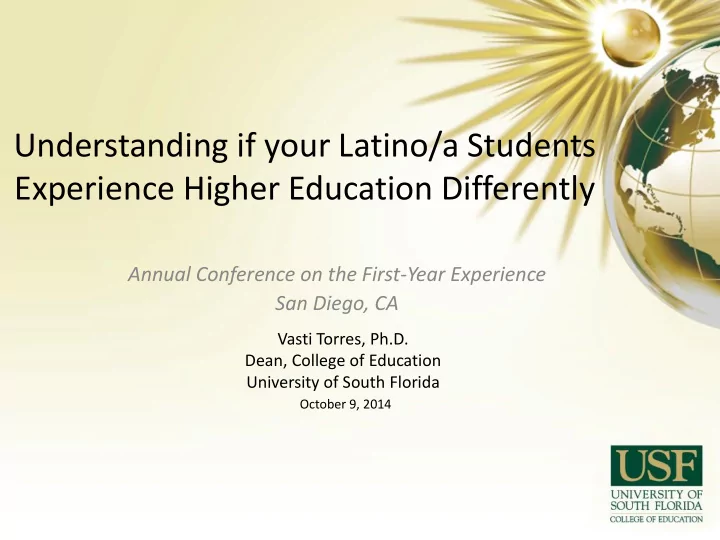

Understanding if your Latino/a Students Experience Higher Education Differently Annual Conference on the First-Year Experience San Diego, CA Vasti Torres, Ph.D. Dean, College of Education University of South Florida October 9, 2014
What do we know about student success? Factors that influence retention and graduation: • Parents’ educational level – first generation college students are LESS likely to succeed. • Parental income – low income students are LESS likely to succeed. • Academic preparation – minority students are LESS likely to have sufficient academic preparation. • Native language spoken – English as a second language students do not do as well. • Hours worked for pay – underrepresented students tend to work MORE hours for pay.
Ways knowledge about student success been used with Latino/a students? • Focus on deficiencies of students. • Excuses for explaining students failure. • Allows for the status quo to continue. • Used to justify denial of access to students who do not meet “higher standards .” • Knowledge base on deficiencies has influenced the practices around First-Year experiences.
Re-constructing what we know to focus on Latino/a student success • Individual student needs – Information seeking model for first-generation students – Re-constructing negative self-images to positive images. • Environmental needs – Influences on Latino/a student retention • Practitioner needs – What professional development should I think about – Role FYE for students.
Assumptions about information seeking behaviors • Assumptions professionals have about how students seek out information. – They will trust my advice. – They will come to me at appropriate times of the year. – If they do not come to see me, they are doing fine. – They prefer to talk to me instead of reading a piece of paper. • Reality for first generation college students. – Many first generation students do not understand the role of advisor. – Peers are more trusted sources of information than professionals. – Many do not know the question to ask until a crisis occurs, then it may be too late. – Change in behavior does not usually occur till they experience negative consequences.
Help Seeking Patterns Model of First Gener ation Latino/a College Students’ Approach to Seeking Information Student Lacks Looks to peers Decides this process Advisor/ Initiates new Information and/or pamphlets does not work Mentor process of seeking information Cognitive Dissonance – Questions effectiveness of current methods Waits to be told Risk to seek out authority Does not recognize role of advisor information Feelings of discomfort Does not see advisor as expert Fear of looking foolish October 9, 2014
Seeking Faculty and/or Academic Advisors • Among Latino/a college sophomores only 40% had an identified advisor or mentor (Torres & Hernandez, 2009). • NSSE results (2013) – During the current school year which of the following has been your primary source of advice regarding your academic plans?
Developmental Concerns for Latino/a Students Looking at Latino/a Students’ developmental tasks (Torres & Hernandez, 2007) • Managing familial relationship • Recognizing racism in order to transform negative images into positive ones • Creating an Informed Latino Identity
Additional developmental tasks • Reconstruction of negative images – Stereotype vulnerability (Steele, C.M. & Aronson, J.,1995) • Changing images to positive images: – Development is the organization of increasing complexity in ones life (Sanford, 1967). – Developmental theories have some type of change mechanism that can illustrate this increased complexity (Torres, 2011).
How does development occur - Disequilibrium (dissonance) is introduced and the person has to make different meaning of understanding. (Piaget, 1964) - Development occurs when there is a balance of challenge and support (Sanford, 1967) - Students are not likely understand a concept more than one status above where they are (Loevinger, 1993) October 9, 2014
Changing students’ ways of thinking Developmental changes occur when students make meaning of dissonance in their daily lives. Previous ways of being, Meaning making process – Do I believe knowing and it? Does this change what I think or do? thinking When not done well Alternative Perspective (dissonance) October 9, 2014
Environmental influences on retaining students • If we took academic preparation out of the equation for retention – what other things would influence student success? • Influenced by social cognitive theory (Bandura, 1986) • Environmental Variables – Academic Difficulty – Cultural Affinity – Satisfaction with Faculty – Family Responsibility – Family Status
Social Cognitive Retention Model for Latino Students at Urban Universities (Standardized Solution) (Torres, 2006) . 00 Family Academic Status Integration . 04 (Academic Behaviors) .00 .02 Family .25 .21 Responsibility .25 -.07 .54 Intent Institutional .00 to Commitment Satisfaction .24 Persist with ( Reflection) Faculty .05 .39 Cultural .45 Affinity Encouragement ( Cultural and Social Symbolism ) -.11 Academic Difficulty Vasti Torres, Ph.D.
What can I do? • Being proactive (when the advisor assumes responsibility for making contact with student) is most appropriate for underrepresented students (Museus & Ravello, 2010). • Advisor awareness of students’ worldview increases effectiveness (Coll & Zalaquett, 2008). • Skills, knowledge, and awareness to address cultural issues with someone who is from a different culture than yourself (Pope, Reynolds, & Mueller, 2004). • Information about difference is not as effective as experiences with different cultures.
Issues to consider • What does a trusting and developmental relationship look like within your role? • Assist students in making meaning of alternative messages. • Helping students understand new social capital. October 9, 2014
Recommend
More recommend